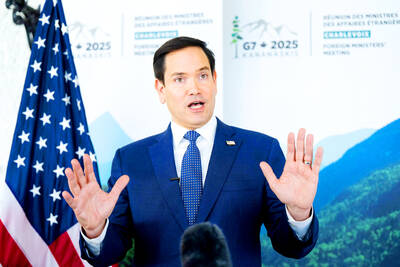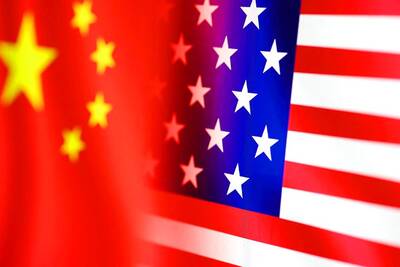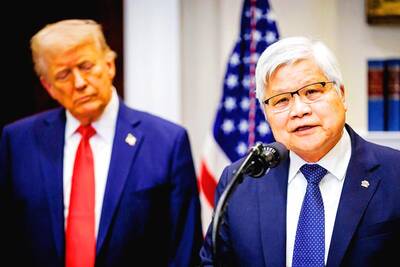Japanese Prime Minister Junichiro Koizumi yesterday picked outspoken conservatives as his new top ministers and then a hawkish successor, probably spelling more tension with Asian neighbors in his remaining year in office.
Koizumi, the longest serving Japanese premier in a generation, reshuffled his Cabinet after winning a landslide victory in an election he cast as a referendum on reforming the economy and bringing new faces into politics.
But he tapped two party stalwarts -- both grandsons of former prime ministers -- as his top aides.
Shinzo Abe, 51, was given the powerful post of chief Cabinet secretary, while Taro Aso, a hardliner on China, became foreign minister.
"The Cabinet has moved to the right with the reshuffle," said Sadafumi Kawato, a professor of Japanese politics at Tohoku University. "Japanese foreign policy will get closer to America and remain far apart from China and South Korea."
As chief Cabinet secretary, who is the government spokesman and becomes the acting prime minister when Koizumi travels abroad, Abe's position as a frontrunner to be prime minister when Koizumi leaves office next September has been strengthened.
Both Abe and Aso are staunch defenders of Koizumi's visits -- the latest being on Oct. 17 -- to the Yasukuni shrine, which honors 2.5 million Japanese war dead, including notorious war criminals.
"If the prime minister, the chief Cabinet secretary and the foreign minister all turn up to visit Yasukuni, it is feared it would lead to a quite serious situation," said outgoing foreign minister Nobutaka Machimura, who was sidelined in the new Cabinet.
Mizuho Fukushima, head of the left-wing opposition Social Democratic Party, said Koizumi, who had run on a platform of economic change, was "promoting changes to the Constitution and Yasukuni pilgrimages, bringing Japan's relations with the rest of Asia to a very disastrous state."
In April, Aso was the only Cabinet member to pay a pilgrimage to Yasukuni for its spring festival, just as Koizumi was seeking a summit in Jakarta with Chinese President Hu Jintao (
Aso, addressing his first press conference as the incoming foreign minister, said the Yasukuni shrine was not the only issue between the neighbors and urged dialogue.
"Apart from that one particular issue, Japan-China relations as a whole are basically proceeding well in such areas as economic relations and exchanges of youth culture," he said.
Abe, known for his ease with the media, has won a public following for his strongly worded rebukes of North Korea, especially for its past abductions of Japanese citizens.
Abe said Koizumi was still committed to the reforms on which he ran in the election.
"I want to do my best to push forward the structural reforms currently proceeding under Prime Minister Koizumi's leadership. This Cabinet is one that will turn reform into reality," he said.

‘CROWN JEWEL’: Washington ‘can delay and deter’ Chinese President Xi Jinping’s plans for Taiwan, but it is ‘a very delicate situation there,’ the secretary of state said US President Donald Trump is opposed to any change to Taiwan’s “status quo” by force or extortion and would maintain that policy, US Secretary of State Marco Rubio told the Hugh Hewitt Show host on Wednesday. The US’ policy is to maintain Taiwan’s “status quo” and to oppose any changes in the situation by force or extortion, Rubio said. Hewitt asked Rubio about the significance of Trump earlier this month speaking with Taiwan Semiconductor Manufacturing Co (台積電) chairman C.C. Wei (魏哲家) at the White House, a meeting that Hewitt described as a “big deal.” Asked whether the meeting was an indication of the

‘RELATIVELY STRONG LANGUAGE’: An expert said the state department has not softened its language on China and was ‘probably a little more Taiwan supportive’ China’s latest drills near Taiwan on Monday were “brazen and irresponsible threats,” a US Department of State spokesperson said on Tuesday, while reiterating Washington’s decades-long support of Taipei. “China cannot credibly claim to be a ‘force for stability in a turbulent world’ while issuing brazen and irresponsible threats toward Taiwan,” the unnamed spokesperson said in an e-mailed response to media queries. Washington’s enduring commitment to Taiwan will continue as it has for 45 years and the US “will continue to support Taiwan in the face of China’s military, economic, informational and diplomatic pressure campaign,” the e-mail said. “Alongside our international partners, we firmly

KAOHSIUNG CEREMONY: The contract chipmaker is planning to build 5 fabs in the southern city to gradually expand its 2-nanometer chip capacity Taiwan Semiconductor Manufacturing Co (TSMC, 台積電), the world’s biggest contract chipmaker, yesterday confirmed that it plans to hold a ceremony on March 31 to unveil a capacity expansion plan for its most advanced 2-nanometer chips in Kaohsiung, demonstrating its commitment to further investment at home. The ceremony is to be hosted by TSMC cochief operating officer Y.P. Chyn (秦永沛). It did not disclose whether Premier Cho Jung-tai (卓榮泰) and high-ranking government officials would attend the ceremony. More details are to be released next week, it said. The chipmaker’s latest move came after its announcement earlier this month of an additional US$100 billion

Authorities yesterday elaborated on the rules governing Employment Gold Cards after a US cardholder was barred from entering Taiwan for six years after working without a permit during a 2023 visit. American YouTuber LeLe Farley was barred after already being approved for an Employment Gold Card, he said in a video published on his channel on Saturday. Farley, who has more than 420,000 subscribers on his YouTube channel, was approved for his Gold Card last month, but was told at a check-in counter at the Los Angeles International Airport that he could not enter Taiwan. That was because he previously participated in two